International Gay Rugby's Lawrence Howard on tackling prejudice and the rise of inclusive rugby
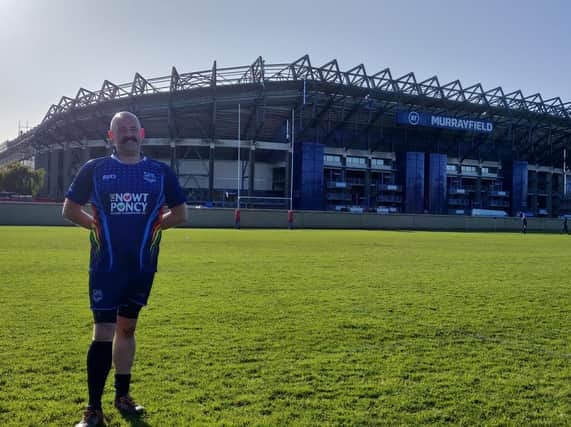

“We were put on a wet field with a ball and you were just expected to know what to do,” he says. “That’s how PE worked back in the ‘80s. When, occasionally, it’d be rugby rather than football, I’d naturally understand what was going on,” he adds. “Other people saw chaos, but for me it just made sense.”
Lawrence’s relationship with rugby is profound and complex.
Advertisement
Hide AdAdvertisement
Hide AdIt’s a sport he loves and still plays to this day despite admitting that ‘play’ is a strong word for what he does - “I participate,” he says with a chuckle. It’s a sport which repelled him with its homophobia and pervasive ‘rugby lad’ culture in the ‘90s, yet it’s in rugby dressing rooms where he’s formed lifelong friendships.
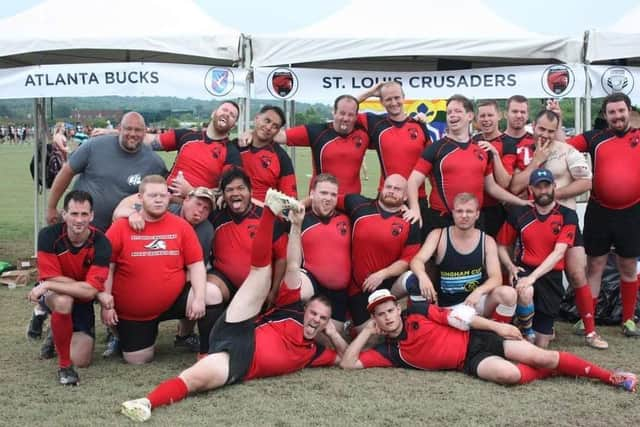

It’s a sport which Lawrence believes has an almost limitless potential to be an avenue for social good, yet whilst he was still setting up his official International Gay Rugby email account in July, he learned that World Rugby, the sport’s governing body, proposed a ban on trans women from women’s rugby entirely.
Lawrence is also friends with the five men who, in 1995, met up at a London bar and formed the Kings Cross Steelers, the UK’s first so-called ‘gay’ rugby club.
And, despite describing himself as ‘not exactly the most sporty person in the world’, he’s been at the vanguard of inclusive rugby in the North West, playing for Manchester Spartans, Liverpool Tritons, and Typhoons RUFC in Preston (and helping found the latter two) and has gone on to represent Europe on International Gay Rugby’s Executive Committee.
Very simply, rugby is in Lawrence’s veins.
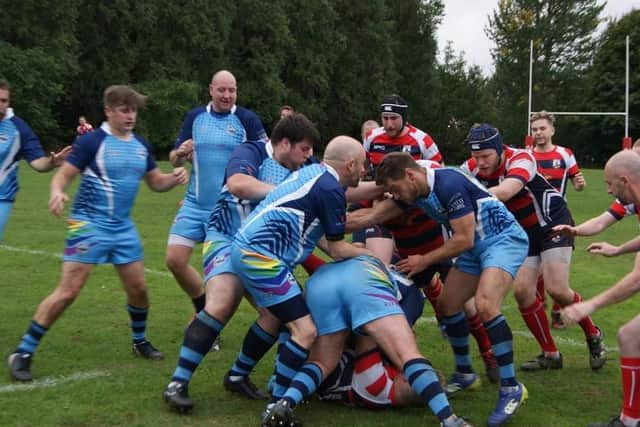

-
Advertisement
Hide AdAdvertisement
Hide AdAt school, Lawrence ran the Dungeons and Dragons club. “I was always in the nerdy clubs rather than the sports ones because rugby lived up to all the negative stereotypes,” he explains.
“The whole getting drunk and trying to eat a hanging basket in a bar thing put me off. It wasn’t for me.
“The sport has a lot to do to eradicate that stereotype,” adds Lawrence, 46. “That’s why I thought inclusive rugby was so amazing, because it’d make rugby more welcoming. And the inclusive clubs were run by players themselves, not old guys in blazers who’d retired 30 years ago and had no concept of how the world had moved on.”
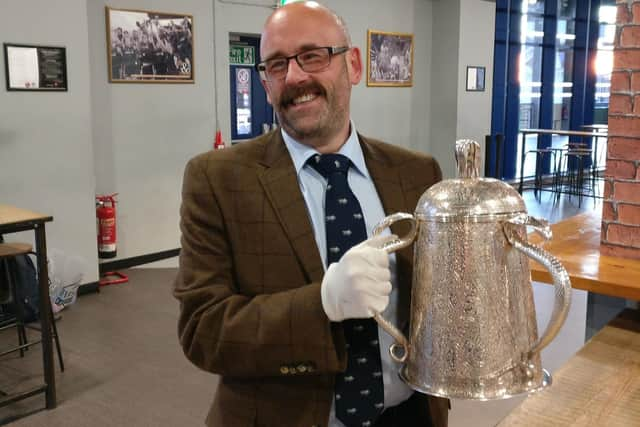

But all was not sunshine and roses, with ignorance sometimes souring progress. “One inclusive club tried to hire a scrum machine from a local club for training and were told they couldn’t because the club’s players didn’t want to catch AIDS,” says Lawrence. “That was the ‘90s; we’re not talking 60 years ago here.”
Advertisement
Hide AdAdvertisement
Hide AdThere was a cruel twist of fate when it came to Lawrence’s own playing career, too. On the cusp of his debut for the Manchester Spartans in the early 2000s, he slipped on the stairs at Manchester Oxford Road station and broke his ankle.
While he returned to training, Lawrence never quite felt up for a match and slowly drifted away from the sport.
“I didn’t touch a rugby ball for 10 years,” says Lawrence, who lives in Preston. “In 2012, a friend said he was going to Spartans’ new players’ day and asked me to come. I thought ‘go on then’. He didn’t turn up, but I had a great time and caught the bug again.”
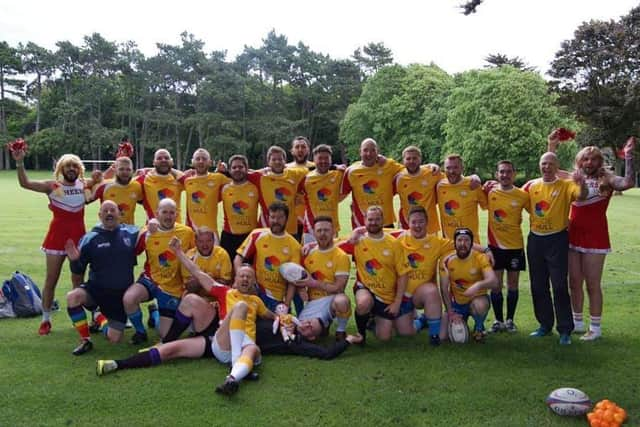

Having been back on the rugby scene for four years with the Spartans, in 2016 Lawrence went to Nashville, Tennessee for the biggest amateur rugby tournament in the world: the Bingham Cup.
Advertisement
Hide AdAdvertisement
Hide AdThe competition is named for Mark Bingham, a 6’4”, 102kg gay rugby player for San Francisco Fog, an inclusive team formed in 2000. On September 11, 2001, Mark was the last person to board United Airlines flight 93. Along with three other passengers, he tried to stop the hijackers by storming the cockpit and managed to prevent them from targeting the Capitol Building or the White House. They crashed into a field at 580mph. Nobody survived.
Now welcoming dozens of inclusive clubs from across the globe every two years, the Bingham Cup is iconic.
“There’s nothing like a Bingham Cup,” says Lawrence, who turned out for the St Louis Crusaders in Nashville. To this day, Mark Bingham’s mother, Alice Hoagland, attends every match.
-
In 2017 and now in his early 40s, Lawrence was thinking of hanging up his boots and gum-shield when he was approached by a friend who’d been given funds to set up an IGR club in Liverpool.
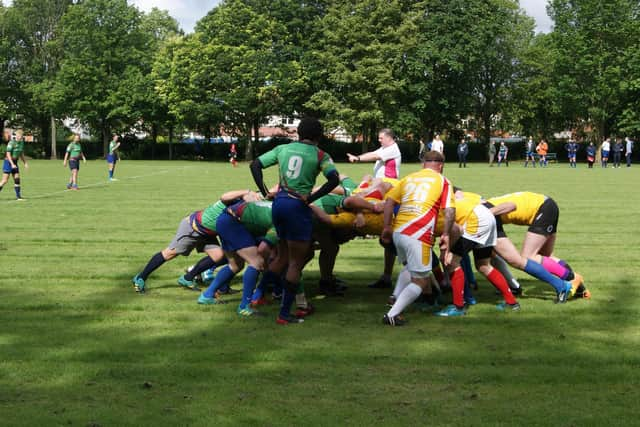

Advertisement
Hide AdAdvertisement
Hide AdLawrence ended up playing for the newly-formed Liverpool Tritons for 18 months and, during his time on Merseyside, also made another discovery.
“The Tritons didn’t play every week, so I started turning out for Mossley Hill RUFC, who we rented a pitch from, and it was honestly one of the best decisions I ever made,” says Lawrence.
“I was nervous about playing for a regular team, but they were some of the loveliest guys I’d ever played with; nothing like the ‘lads, lads, lads’ type people who’d put me off before.
“When it’s done right, the camaraderie in rugby is amazing,” he adds. “Looking at the scale of inclusive rugby now with 80-odd clubs and 20-odd in formation, there’s so much pride. With each new club, I think back to those guys at King’s Cross station.”
Advertisement
Hide AdAdvertisement
Hide AdInclusive rugby was on the up, with talk turning to a potential club in Blackpool. A chat with the RFU’s Rugby Development Officer for Lancashire in the summer of 2017, however, started the ball rolling on a Preston club and names were being floated in the bar at Preston Grasshoppers when a BAE test flight soared overhead.
Typhoons RUFC it was.
“There was a moment when my heart sank when only five people turned up to the first training session, but it’s just gone from strength-to-strength,” said Lawrence, who took a step back from running the club when he was named on the IGR committee. “A guy at the club said I look 10 years younger since I stopped doing the day-to-day running of the club, but it’s been so enjoyable. Stressful, but worth every single moment."
-
Stressful but worthwhile would also be an accurate summation of Lawrence’s time on the IGR committee, too.
“I wanted to do something dramatic for my last few years in rugby, so I threw my name in the hat never in a million years thinking I’d get elected,” he says, with his remit being to support inclusive rugby across Europe. “But here we are! It’s been a baptism of fire.”
Advertisement
Hide AdAdvertisement
Hide AdOn top of Covid-19 and the sport’s shaky economics, Lawrence and the board also had to grapple with World Rugby’s blanket ban on trans women playing elite women’s contact rugby.
WR based its decision on research they say found a 20% to 30% increase in injury risk factors when a player who’s gone through male puberty tackles a female player, even when trans women suppress their testosterone levels in line with International Olympic Committee rules.
This paradigm, however, has been lambasted by campaigners and academics alike, who claim it has no basis in scientific fact and that no peer-reviewed study has been undertaken. It is currently up to individual federations whether to enforce World Rugby’s policy at the grassroots level.
“It betrays a frustrating level of ignorance,” Lawrence says. “It goes against everything we believe in and, sadly, it’s brought some dreadful people out the woodwork on social media and some horrific transphobia, as if this is just about a man who’s mediocre at rugby being able to put a dress on and feel like he’s good.
Advertisement
Hide AdAdvertisement
Hide Ad“It’s offensive that there are people in the world who actually think that,” adds Lawrence. “I really hope that kind of discourse isn’t influencing things at a senior level, because we’d be in a very dire situation if it was.”
Lawrence’s story is one of conviction and courage. From Dungeons and Dragons to International Gay Rugby’s Executive Committee via Preston and Nashville. Not bad for a lad from a football school.
The Lancashire Post is more reliant than ever on you taking out a digital subscription to support our journalism. For unlimited access to Lancashire news and information online, you can subscribe here: https://www.lep.co.uk/subscriptions
Comment Guidelines
National World encourages reader discussion on our stories. User feedback, insights and back-and-forth exchanges add a rich layer of context to reporting. Please review our Community Guidelines before commenting.